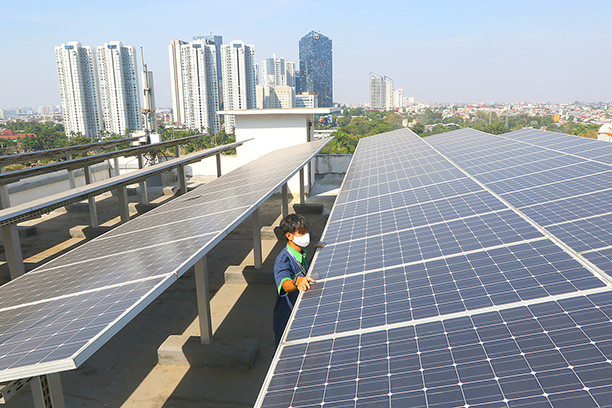Energy, mining investments in RI fall to 5-year record low in 2020
In Indonesia, companies delayed or even pulled out of several multimillion dollar projects last year, including projects to develop metal smelters, oil and gas fields, power plants and oil refineries.
Change text size
Gift Premium Articles
to Anyone

E
nergy and mining investments hit the lowest level in at least five years in 2020, shrinking 26.6 percent year-on-year (yoy) to $24.4 billion as the coronavirus outbreak canceled projects across the board, reducing Indonesia’s chance of meeting its economic goals on time.
Energy and Mineral Resources (ESDM) Ministry data revealed that the sharpest annual decline was booked in the electricity sector (42.15 percent), followed by mining (40 percent), renewables (17.7 percent) and then oil and gas (6.21 percent).
“There was indeed a decline compared to 2019. This was because of the challenges we faced,” acknowledged Energy Minister Arifin Tasrif at a virtual press conference on Jan. 7.
The COVID-19 pandemic rammed global energy and minerals demand, such that commodity prices fell to record lows and companies drastically cut capital spending.
The International Energy Agency (IEA) projects that global energy investments, excluding mining investments, fell 18 percent yoy to $1.55 trillion in 2020.
In Indonesia, companies delayed or even pulled out of several multimillion dollar projects last year, including projects to develop metal smelters, oil and gas fields, power plants and oil refineries. The data shows that energy and mining investments hit 23.6 percent lower than the 2020 target of $35.9 billion.
The biggest shortfalls were in mining (50 percent), followed by electricity (41.67 percent), renewables (39.14 percent) and oil and gas (12.32 percent).
“Investments falling below target due to the pandemic is understandable. But I also see that low investments arose from unresolved issues not related to the pandemic,” executive director Fabby Tumiwa of the Institute for Essential Services Reform (IESR), which often advises players in the renewables industry, said on Jan. 8.
Fabby said that several micro hydro and hydropower plants due to start operating in 2020 were delayed due to bankability and auction issues with state-owned electricity giant PLN.
Ministry data shows that in 2020, Indonesia increased its electricity generating capacity by building new green plants, predominantly hydropower plants, with a combined output of 176 megawatts (MW). In comparison, the country built new plants with 503 MW of combined output in 2019.
Several studies say Indonesia will miss its aim to achieve 23 percent of its energy from renewables by 2025 under a “business as usual” scenario.
In the electricity sector, the postponement of many power plant development projects risks further pushing back the country’s six-year-old program to build 35 gigawatts (GW) of new power plants by 2029.
Many of the delayed plants include big coal-fired power plants (PLTU) like coal giant PT Adaro Energy’s 2,000 MW Batang plant in Central Java, which many experts say will exacerbate PLN’s financial problems.
“Our commitment to the 35 GW [electrification projects] in the pipeline that have signed contracts will be fulfilled, but we are trying to renegotiate [the contracts],” said minister Arifin.
In the mining sector, lawmakers delayed a landmark raw metals export ban by a year to 2024 in a Mining Law amendment, following delays in smelter projects central to the government’s “large-scale downstreaming” goals.
Ministry data shows that only two new nickel smelters were completed last year instead of the initial target of four metal smelters.
In the global oil and gas industry, upstream companies cut capital spending by an average 30 percent last year, leading Indonesia to lower its gas output target by 14.2 percent to 5,727 million metric standard cubic feet per day (mmscfd) and its oil output target by 4 percent to 725,000 barrels of oil per day (bopd).
Oil and gas supermajors Shell and Chevron were reported in August as planning to exit the nationally strategic gas-rich Masela Block and the Indonesia Deepwater Development (IDD) projects.
“The decline in investment was due to weak oil prices and the pandemic,” said energy economist Fahmy Radhi of Gadjah Mada University (UGM), also on Jan. 8.
The delays put at risk Indonesia’s plan to produce 1 million bopd and 12300 mmscfd by 2030.
Going forward, the energy ministry expects investments to reach $36.4 billion in 2021, higher than even 2019, led by investment doubling in renewable energy as well as higher investments in mining, electricity and oil and gas.
Fahmy expressed pessimism, however, projecting investments to reach $30.1 billion this year, higher than in 2020 but lower than 2019, with the caveat that “the COVID-19 dies down”.
The IESR’s Fabby said in 2021, realizing investments depended not only on containing the health crisis but also on the government’s ability to cut the red tape that had been blocking investments long before COVID-19 arrived in the country.
“The implementation of the Job Creation Law will be the litmus test, because this is the law the government has been hyping up as a means of structural reform to boost investment,” he said.









